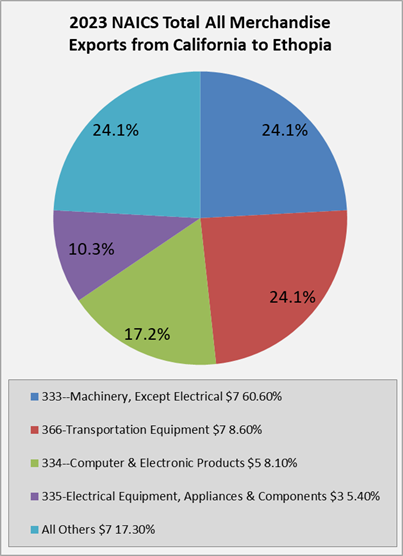Trading Partner Portal: Ethiopia
Overview
Trade Overview
 Ethiopia has a population of approximately 132.06 million and is the second most populous country in Africa and the most populous landlocked country in the world. In 2024, Ethiopia’s GDP was $126.77 billion.
Ethiopia has a population of approximately 132.06 million and is the second most populous country in Africa and the most populous landlocked country in the world. In 2024, Ethiopia’s GDP was $126.77 billion.
U.S. – Ethiopia Trade

Two-way trade between the United States and Ethiopia was approximately $1.48 billion in 2024. The United States exported over $1.02 billion to Ethiopia, making it the 81st largest export destination for the U.S. Top exports consisted of transportation equipment ($572 million), non-electrical machinery ($163 million), other special classification provisions ($68 million), agricultural products ($49 million), and computer and electronic products ($47 million).
Imports from Ethiopia were $466 million, with the top categories being agricultural products ($178 million), apparel and accessories ($162 million), goods returned ($75 million), processed foods ($35 million), and other classification provisions ($5 million).
California – Ethiopia Trade
In 2024, California was one of the top ten state exporters to Ethiopia with approximately $153 million. Transportation equipment was the top export coming in at $118 million. Other top exports included computer and electronic products ($15 million), non-electrical machinery ($7 million), chemicals ($4 million), and electrical equipment, appliances & components ($3 million).
California imported $53 million from Ethiopia in 2024, in which agricultural products made up $46 million of the total. This was followed by processed foods ($4 million), apparel and accessories ($2 million), and miscellaneous manufactures and leather and allied products at less than $1 million. U.S. Department of Commerce
FDI – Ethiopia
The U.S. invested $34 million in foreign direct investment in Ethiopia in 2024, a 6.3% increase from 2023. BEA
Trade in Goods with Ethiopia Data – U.S. Census
Ethiopia profile – BBC News
Trade Agreements
African Growth & Opportunity Act (AGOA)
The African Growth and Opportunity Act (AGOA), extended to 2025, initially was enacted in 2000, eliminating duties on imports from African nations into the United States if those nations made significant efforts to open their economies.
Since its inception, AGOA has helped increase U.S. two-way trade with sub-Saharan Africa. In 2015, U.S. exports with the AGOA nations totaled $17.5 billion, nearly triple the amount in 2002.
In 2015, Congress approved legislation to extend AGOA until 2025, granting the longest extension in its history.
Following its extension, President Obama remarked, “Now that it’s been renewed, AGOA will be central to our efforts to boost the trade and investment that supports hundreds of thousands of jobs both in Africa and the United States, creating opportunities for all of us. And I’m especially pleased that AGOA will continue to encourage good governance and labor and human rights.”
| U.S. Strategy Toward Sub-Saharan Africa White House, August 2022 FACT SHEETVital Partners, Shared Priorities: The Biden Administration’s Sub-Saharan Africa Strategy U.S. Department of State, August 8, 2022U.S. Food Security Assistance to Sub-Saharan Africa U.S. Department of State, August 8, 2022Statement by President Biden on the U.S.-Africa Leaders Summit White House, July 20, 2022 |
President Signs CalChamber-Supported Trade Bills
June 30, 2013
Statement by Ambassador Michael Froman on Congressional Passage of TPA
June 25, 2015
Presidential Proclamation – African Growth and Opportunity Act
December 2013
For more information, please see:
U.S. Department of State – AGOA
International Trade Administration – AGOA
East Africa Trade Agreement Is Latest Big Step Forward
The signing of the Cooperation Agreement between the United States and the East African Community (EAC) – a regional bloc comprised of Kenya, Uganda, Tanzania, Rwanda and Burundi – is a major relationship milestone.
The agreement centers on building trade capacity in the EAC nations on three issues of importance to the private sector:
- Trade Facilitation
- Sanitary and Phytosanitary (SPS) Measures
- Technical Barriers to Trade (TBT)
The agreement shows that the United States and EAC nations are on the same page in terms of the path forward to building local economic growth and further encouraging foreign direct investment in the region. The work tackled after the signing of this agreement will benefit all businesses in the EAC – both local and foreign.
U.S. Chamber of Commerce, February 26, 2015
U.S. Strategy
U.S. Strategy Toward Sub-Saharan Africa
In June 2012, Obama announced the new U.S. Strategy toward Sub-Saharan Africa with four main objectives:
(1.) strengthen democratic institutions
(2.) spur economic growth, trade and investment
(3) advance peace and security
(4) promote opportunity and development
This strategy emphasizes U.S. support for sustainable economic growth and prosperity in Africa.
Power Africa Initiative
Currently, over two-thirds of the population of 800 million people in sub-Saharan Africa has no access to power or electricity. The Power Africa Initiative was launched in June 2013 to double access to electricity in sub-Saharan Africa and provide more than 10,000 megawatts of electricity generation capacity that is cleaner and more efficient.
The U.S. government has committed to providing over $7 billion in aid and loan guarantees over a five-year period. Twelve U.S. government agencies including the U.S. Export-Import Bank (EX-IM), the Overseas Private Investment Corporation (OPIC) and the U.S. Trade and Development Agency (USTDA) are combining efforts to provide funding and technical assistance to the initiative.